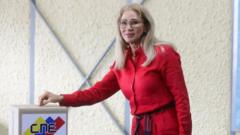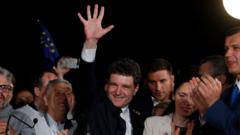In a shocking political move, Geert Wilders, head of the Freedom Party, has caused the collapse of the Dutch government less than a year after its formation. Prime Minister Schoof will resign, and the nation braces for upcoming elections amid tensions surrounding asylum policies.
Turbulence in Dutch Politics as Geert Wilders Withdraws from Coalition

Turbulence in Dutch Politics as Geert Wilders Withdraws from Coalition
The Dutch government faces uncertainty after far-right leader Geert Wilders exits the ruling coalition, prompting Prime Minister Dick Schoof to step down.
The Dutch political landscape has been shaken after Geert Wilders, leader of the far-right Freedom Party (PVV), withdrew his party from the governing coalition, leading to the collapse of the government just months after it was formed. Prime Minister Dick Schoof confirmed his resignation during an emergency cabinet meeting held Tuesday and is expected to submit the cabinet's resignation to King Willem-Alexander by the end of the day. Schoof described Wilders' decision as "irresponsible and unnecessary" and expressed his disappointment in a televised address.
Wilders has publicly declared his ambition to become prime minister and to expand the influence of the PVV in the forthcoming elections. With a crucial NATO summit scheduled in The Hague later this month, Schoof's ministers will likely operate in a caretaker role until a new election date is announced.
Tensions escalated as Wilders exited a brief meeting with coalition leaders, where he had presented 10 new asylum requests, including calls for a freeze on asylum applications and restrictions on family reunification policies. While some of these measures reflect previously agreed policies, coalition members expressed frustration over Wilders' insistence on demanding further action, with many voicing concern about the motives behind the sudden withdrawal.
Political leaders condemned Wilders' actions, with VVD leader Dilan Yesilgoz labeling it as "super irresponsible," while Deputy Prime Minister Mona Keijzer stated that the decision betrayed the interests of the Netherlands. Opposition parties perceived the coalition as ineffective, with the Socialist Party proclaiming that citizens had been freed from a "political hostage situation."
Economically, experts, including ABN AMRO's chief economist Sandra Phlippen, noted that the government's collapse is unlikely to have immediate fiscal repercussions, as the administration struggled to implement significant policies during its brief tenure. Analysts suggest that Wilders' push for the coalition's downfall may be a strategy to reinvigorate his party's waning support by focusing on immigration issues in the run-up to elections, though past performance in handling those policies raises questions about the efficacy of this gamble.
The unfolding situation continues to develop as key players in Dutch politics respond to this unexpected shift in governance.



















